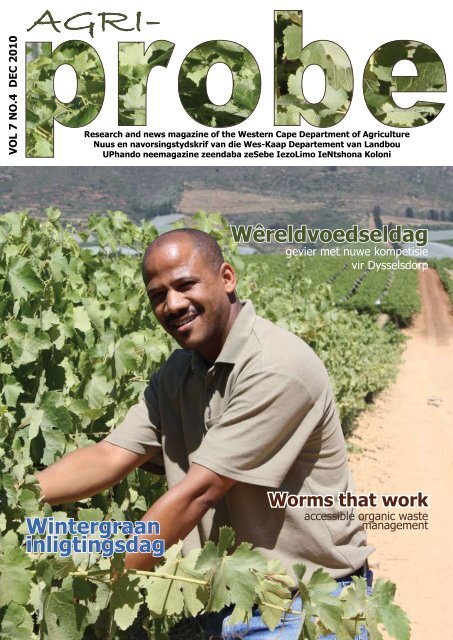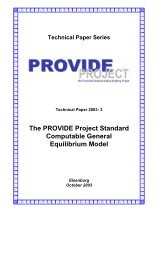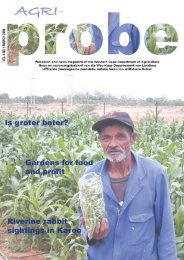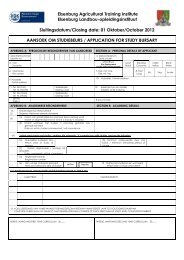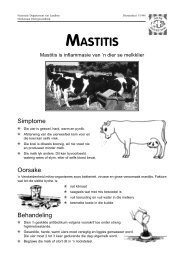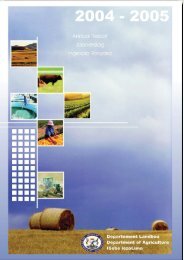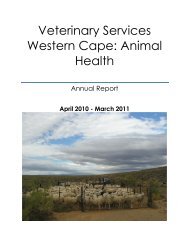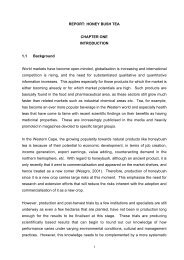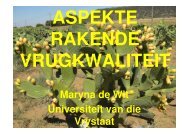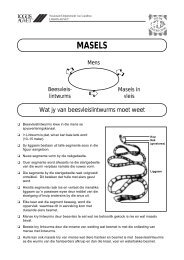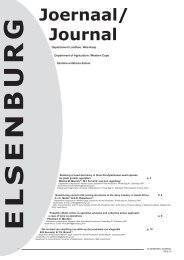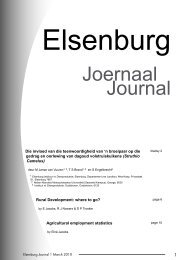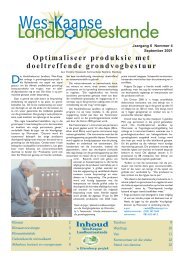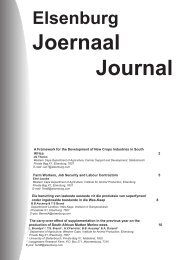Download AgriProbe - Department of Agriculture: Western Cape
Download AgriProbe - Department of Agriculture: Western Cape
Download AgriProbe - Department of Agriculture: Western Cape
Create successful ePaper yourself
Turn your PDF publications into a flip-book with our unique Google optimized e-Paper software.
Research and news magazine <strong>of</strong> the <strong>Western</strong> <strong>Cape</strong> <strong>Department</strong> <strong>of</strong> <strong>Agriculture</strong><br />
Nuus en navorsingstydskrif van die Wes-Kaap Departement van Landbou<br />
UPhando neemagazine zeendaba zeSebe IezoLimo IeNtshona Koloni<br />
VOL 7 NO.4 DEC 2010AGRI-<br />
Wintergraan<br />
inligtingsdag<br />
Wêreldvoedseldag<br />
gevier met nuwe kompetisie<br />
vir Dysselsdorp<br />
Worms that work<br />
accessible organic waste<br />
management
Editorial<br />
Redaksioneel<br />
2<br />
The <strong>Department</strong> <strong>of</strong> <strong>Agriculture</strong>, <strong>Western</strong> <strong>Cape</strong> had many<br />
highlights through out the year, but there is one that is arguably<br />
the cherry on the cake – our annual Farm Worker <strong>of</strong> the Year<br />
competition – also the only one in the country! This year was no<br />
exception when Christo Somer <strong>of</strong> Riebeek Kasteel Cellars walked<br />
away with the coveted award.<br />
Although I have only been with the <strong>Department</strong> for a couple <strong>of</strong><br />
months, I was awarded the honour <strong>of</strong> being part <strong>of</strong> the adjudication<br />
process. It was certainly one <strong>of</strong> the most humbling experiences <strong>of</strong><br />
my life listening to the farm workers talk about the sterling job they<br />
do to help put food on our tables. I wanted to make each one <strong>of</strong><br />
them a Farm Worker <strong>of</strong> the Year. I also had the privilege <strong>of</strong> being<br />
present when the Prestige Farm Worker Forum (all the previous<br />
winners) asked the honourable Premier, Ms Helen Zille, to be<br />
the keynote speaker at the event and it was at this meeting that I<br />
heard that farm workers never go on strike! As the <strong>Western</strong> <strong>Cape</strong><br />
Province, we can be so proud <strong>of</strong> our farm workers and we should<br />
do everything possible to develop and empower them.<br />
Another highlight was our own Farm Worker Choir competition<br />
between all the <strong>Department</strong>’s research farms. Again, I had a front<br />
row seat as a judge and their willingness, commitment, discipline<br />
and beautiful voices just blew me away. Oudtshoorn Research<br />
Farm was crowned as the winner, but if any <strong>of</strong> the choirs ever<br />
brought out a CD, I’ll be the very first to buy it.<br />
This edition <strong>of</strong> <strong>AgriProbe</strong> is absolutely filled to the brim with<br />
highlights ranging from a very successful World Food Day in<br />
Dysselsdorp; farming with earthworms to embracing needy children<br />
at the Anna Foundation. I think it is very apt to end the year with<br />
such warm and encouraging stories, reflecting not only on our<br />
industry, but also on the hard working and dedicated staff <strong>of</strong> the<br />
<strong>Department</strong> who make all these wonderful achievements happen.<br />
Cheers to an amazing year in agriculture that was and lift your<br />
glass to an even more exciting year that awaits.<br />
Enjoy the holidays and get safely home!<br />
Petro Van Rhyn<br />
Head <strong>of</strong> Communications<br />
<strong>Department</strong> <strong>of</strong> <strong>Agriculture</strong>, <strong>Western</strong> <strong>Cape</strong><br />
If you need any <strong>of</strong> the articles in this magazine in any<br />
other <strong>of</strong> the <strong>of</strong>ficial languages <strong>of</strong> the <strong>Western</strong> <strong>Cape</strong>, we<br />
would be happy to arrange a translation for you. Please<br />
contact the editor on tel 021 808 5022.<br />
Indien u enige van die artikels in hierdie tydskrif in<br />
een van die ander amptelike tale van die Wes-Kaap<br />
benodig, kan u ons gerus kontak om die vertaling<br />
daarvan vir u te reël. Kontak die redakteur by tel<br />
021 808 5022.<br />
Ukuba ufuna naliphina inqaku elikule magazini<br />
ngolunye ulwimi olusesikweni kwiilwimi zeNtshona<br />
Koloni, siya kukulungiselela uguqulelo-Iwimi lenqaku<br />
elo. Nceda ke uqhagamshelane noMhleli kule nombolo<br />
yomnxeba 021 808 5022.<br />
<strong>AgriProbe</strong><br />
is a quarterly magazine, distributed to subscribers at no<br />
charge by the <strong>Western</strong> <strong>Cape</strong> <strong>Department</strong> <strong>of</strong> <strong>Agriculture</strong>.<br />
EDITORIAL<br />
Dr Ilse Trautmann<br />
Douglas Chitepo<br />
Toni Xaba<br />
Gizelle van Wyk<br />
Petro van Rhyn<br />
ADVERTISEMENTS<br />
Gizelle van Wyk<br />
Tel: 021 808 5022<br />
e-mail: gizellevw@elsenburg.com<br />
ADDRESS<br />
Private Bag X1<br />
Elsenburg<br />
7607<br />
Tel: 021 808 5022<br />
Fax: 021 808 7605<br />
e-mail: gizellevw@elsenburg.com<br />
DESIGN AND LAYOUT<br />
Evolution Marketing<br />
PRINTING<br />
Creda Communication<br />
SUBSCRIPTIONS<br />
For free subscriptions to this quarterly magazine,<br />
please submit your details to:<br />
Magrieta de Lange<br />
Tel: 021 808 7613<br />
Fax: 021 808 7605<br />
e-mail: magrietadl@elsenburg.com<br />
Acknowledgement:<br />
Cover page photograph taken by Leensie Streicher <strong>of</strong> Agri Promo.<br />
ISSN: 1810-9799
Contents<br />
Inhoud<br />
Read more about how the<br />
<strong>Department</strong> <strong>of</strong> <strong>Agriculture</strong><br />
intend to make organic waste<br />
management accessible to all<br />
homes page 10<br />
SPESIALE ARTIKELS / SPECIAL FEATURES<br />
The Regional Leaders Forum 4<br />
Worms that work make organic waste<br />
management accessible to all homes 10<br />
Training <strong>of</strong> FSD personnel in farm planning 15<br />
BROKKIES / BITS AND PIECES<br />
Wintergraan inligtingsdag 7<br />
The Anna Foundation 9<br />
Wêreldvoedseldag gevier met nuwe<br />
kompetisie vir Dysselsdorp 14<br />
Research farm choir competition reveals<br />
singing talent 16<br />
<strong>Agriculture</strong> <strong>Western</strong> <strong>Cape</strong> honours farm workers 18<br />
ELSENBURG JOERNAAL / JOURNAL<br />
Faktore wat die voorkoms van putjieskade op<br />
volstruisvelle kan beïnvloed 2<br />
Agricultural economics is alive and well<br />
in Africa! 6<br />
Epidemiology unplugged 9<br />
Rabies events in the <strong>Western</strong> <strong>Cape</strong><br />
Province 2010 11<br />
Message from Gerrit van Rensburg, <strong>Western</strong><br />
<strong>Cape</strong> Minister <strong>of</strong> <strong>Agriculture</strong> and Rural<br />
Development<br />
It is the end <strong>of</strong> yet another year in agriculture. This is a good<br />
time to reflect on the year gone by, but also to look forward to a<br />
well deserved holiday and time with family and friends over the<br />
festive season.<br />
2010 was an eventful year for agriculture. In the <strong>Western</strong><br />
<strong>Cape</strong> we had to face up to a crippling drought in the Southern<br />
<strong>Cape</strong>; we had to continue with the challenges <strong>of</strong> empowering<br />
and assisting our new farmers on their journey towards<br />
sustainability; and we had to contend with a very lean budget,<br />
which was the aftertaste <strong>of</strong> the economic meltdown the world<br />
experienced in 2008.<br />
But when I reflect on this year, I am proud <strong>of</strong> the <strong>Department</strong> <strong>of</strong><br />
<strong>Agriculture</strong>, and by implication, all the staff dedicated to serving<br />
the agricultural sector. It was your individual and collective<br />
contributions that enabled us to face up to all the challenges<br />
<strong>of</strong> the past year. And there were several highlights, <strong>of</strong> which<br />
I will only mention a few: the <strong>Department</strong> was able to assist<br />
Southern <strong>Cape</strong> farmers with drought aid distribution. The<br />
<strong>Department</strong> hosted a successful symposium on equity share<br />
schemes, which was a precursor to the National Symposium<br />
on equity share schemes, where the moratorium on these<br />
schemes was lifted. It was agriculture that took the lead in<br />
promoting a meeting between the <strong>Western</strong> <strong>Cape</strong> Cabinet and<br />
the agricultural sector in our Province.<br />
Another highlight for our <strong>Department</strong> was being acknowledged<br />
as the number one government department for female<br />
empowerment at the annual Top Woman Awards. Our<br />
<strong>Department</strong> was the only provincial department competing<br />
against national departments in the top four positions, making<br />
the victory all the more special.<br />
So to all the men and women in agriculture - have a blessed<br />
festive season and come back in 2011 refreshed and<br />
invigorated for yet another year in agriculture.<br />
<strong>AgriProbe</strong> | December 2010 3
THE REGIONAL<br />
LEADERS FORUM<br />
OPPORTUNITIES FOR THE WESTERN CAPE<br />
Towards the end <strong>of</strong> September 2010 an event <strong>of</strong><br />
immense importance passed by the general public <strong>of</strong><br />
the <strong>Western</strong> <strong>Cape</strong> Province without much attention:<br />
from 27 to 29 September the <strong>Western</strong> <strong>Cape</strong> Province<br />
hosted the 5th Regional Leaders Summit. So, who<br />
attended this Summit and <strong>of</strong> what relevance is it for<br />
the general public and, more specifically, the farming<br />
community <strong>of</strong> this Province?<br />
WHO ARE THE REGIONAL LEADERS?<br />
On 30 January 2002 the leaders <strong>of</strong> a number <strong>of</strong> sub-national<br />
regions met in Munich, Germany to discuss policies that will result<br />
in sustainable development over generations. These regions<br />
were Bavaria (Germany), Quebec (Canada), Shandong (People’s<br />
Republic <strong>of</strong> China), Upper Austria (Austria) and the <strong>Western</strong><br />
<strong>Cape</strong> (South Africa). The leaders experienced the discussions so<br />
valuable that they agreed to regular biannual meetings, during<br />
which two topics <strong>of</strong> relevance will be discussed. Subsequent<br />
meetings took place in Quebec (2004), Upper Austria (2006) and<br />
Shandong (2008). Sao Paulo (Brazil) joined the Forum in 2006<br />
and Georgia (USA) became a member in 2008.<br />
At the time the leaders <strong>of</strong> these seven regions arrived in <strong>Cape</strong><br />
Town for their 2010 meeting, they represented more than<br />
173 million people (2,5% <strong>of</strong> the world’s population) - living on<br />
five continents in both hemispheres <strong>of</strong> the globe. The combined<br />
Regional GDP <strong>of</strong> these regions is more than US$ 2 380 billion and<br />
the regions characterise a very interesting spread, ranging from<br />
highly developed to developing areas. In the richest region the per<br />
capita GDP was US$ 46 752 (± R328 863) per person in 2009 and<br />
in the poorest it was only US$ 5 411 (± R38 062). (The comparable<br />
<strong>Western</strong> <strong>Cape</strong> figure was approximately R61 698.) This means<br />
that the average person in the poorest region has to live from only<br />
11,6% <strong>of</strong> the income that his or her peer receives in the most well<strong>of</strong>f<br />
<strong>of</strong> these sub-national areas.<br />
The interesting and inverse fact is that, during the recent financial<br />
crisis, the economic growth rate in the richest region dipped to a<br />
level as low as minus 5%, while in the case <strong>of</strong> the poorest region<br />
the economy happily chugged along at a healthy 11,6% growth<br />
rate. Unemployment in the regions ranges between the extremes<br />
<strong>of</strong> 10,6% and 3,4% with, interestingly enough, the poorer regions<br />
showing the lowest rates <strong>of</strong> unemployment.<br />
4<br />
by Dr Dirk Troskie<br />
(Specialist Advisor: Agricultural Economics <strong>Western</strong> <strong>Cape</strong> <strong>Department</strong> <strong>of</strong> <strong>Agriculture</strong>)<br />
The implication is that these regions provide a very good crosssection<br />
<strong>of</strong> the realities the world is currently facing. In other<br />
words, it represents a micro-cosmos <strong>of</strong> the world or a laboratory<br />
<strong>of</strong> reality. It follows that the lessons learned and solutions being<br />
developed within this environment can be up-scaled to have a<br />
wider impact and hence the drive to formalise the relationship<br />
between these sub-national entities. Within this context the two<br />
topics for the 2010 Summit was food security (both household<br />
and provincial) and integrated transport.<br />
RELEVANCE TO AGRICULTURE<br />
Despite the differences between the regions, it is significant to<br />
note that the Agricultural Sector plays an extremely important<br />
role in the economies <strong>of</strong> each <strong>of</strong> them. The Agricultural Sector<br />
<strong>of</strong> a region is either an important part <strong>of</strong> the national Agricultural<br />
Sector (up to 24 % in the case <strong>of</strong> Upper Austria and the <strong>Western</strong><br />
<strong>Cape</strong>) or it is an important contributor to the regional economy (up<br />
to 15% in the case <strong>of</strong> Georgia). The implication is that most <strong>of</strong> the<br />
regions are surplus producers <strong>of</strong> food and hence net exporters<br />
<strong>of</strong> agricultural products. Nevertheless, especially in some <strong>of</strong> the<br />
poorest regions, household food security still remains a problem.<br />
More significantly, each <strong>of</strong> these regions does have very specific<br />
qualities <strong>of</strong> interest to the Agricultural Sector <strong>of</strong> the <strong>Western</strong> <strong>Cape</strong><br />
Province. Bavaria has a long history and is quite successful in<br />
not only building its regional image, but also in using that image<br />
to market its products locally and abroad. This, in turn, forms an<br />
integral part <strong>of</strong> its rural development strategy. At the same time<br />
it is probably one <strong>of</strong> the global leaders in on-farm renewable<br />
energy; a phenomenon we will have to master if we want to<br />
maintain our presence in the markets <strong>of</strong> the developed world.<br />
The main event on the calendar <strong>of</strong> farmers in the Organic Sector<br />
world-wide (BioFach) take place annually in Bavaria.<br />
<strong>AgriProbe</strong> | Desember 2010
Do not make a mistake - although they do maintain good<br />
neighbourly relations, there is significant competition between<br />
Bavaria and Upper Austria. The Austrians are as strong in the fields<br />
<strong>of</strong> on-farm renewable energy, rural development and the marketing<br />
<strong>of</strong> regional products and they have experience in the field <strong>of</strong> farmer<br />
support and agricultural schooling that they want to share with us.<br />
Very few people realise that the Agricultural Sector contributes<br />
15% to the economy <strong>of</strong> the State <strong>of</strong> Georgia in the USA; that is<br />
why it is called the “Peach State”. Of special importance for us is<br />
the fact that they have succeeded in establishing an Agricultural<br />
Innovation Centre and for a number <strong>of</strong> years a database <strong>of</strong> farms<br />
and farmers are quite successfully maintained. Furthermore,<br />
SPS matters and stewardship <strong>of</strong> land programmes form integral<br />
parts <strong>of</strong> their programmes.<br />
Most people know that it gets extremely cold in Quebec in winter<br />
and that it is a French-speaking region on an English-speaking<br />
Continent. However, they are also world leaders on food security<br />
and, given their French roots, a potential significant market for<br />
South African wines.<br />
With the current financial instability in the developed world,<br />
everybody is focussing on China as a potential market. Yet,<br />
it is much more appropriate to focus on a specific part <strong>of</strong> this<br />
immense country. Shandong is the third largest economy in<br />
China and indisputably their leader in the field <strong>of</strong> aquaculture and<br />
viticulture. Furthermore, Shandong is also the home to one <strong>of</strong> the<br />
biggest agricultural machinery producing facilities in China.<br />
Brazilian agriculture is definitely one <strong>of</strong> the upcoming commercial<br />
farming success stories in the world. Sao Paulo will host the 6th<br />
Regional Leaders Summit in 2012. As Brazil also has a number<br />
<strong>of</strong> challenges mirroring ours, it has interesting solutions pertaining<br />
to urban agriculture and organic farming.<br />
It is clear that each region do have very specific agricultural<br />
characteristics <strong>of</strong> importance to the <strong>Western</strong> <strong>Cape</strong>. We, <strong>of</strong><br />
course, also have some things <strong>of</strong> interest to them. For this<br />
reason a Declaration (with an Agricultural Chapter) was signed<br />
at the end <strong>of</strong> the 5th Regional Leaders Summit. This Declaration<br />
makes provision for multilateral and bilateral events and, who<br />
knows, perhaps we will get an exchange <strong>of</strong> young farmers going<br />
under the auspices <strong>of</strong> this Forum.<br />
WHAT NOW?<br />
All seven <strong>of</strong> the regions forming part <strong>of</strong> the Regional Leaders<br />
Forum is <strong>of</strong>ten considered by their compatriots to be somewhat<br />
daring regions; they are not that keen to always diligently toe the<br />
line. Yet, when combined, they do have a significant presence<br />
on the global playing field and each <strong>of</strong> the regions do have a<br />
very specific quality or skill <strong>of</strong> interest to the Agricultural Sector<br />
<strong>of</strong> the <strong>Western</strong> <strong>Cape</strong> Province. The principle to exchange these<br />
features was cemented in the Declaration signed at the end <strong>of</strong><br />
the 5th Regional Leaders Summit and the Province has already<br />
developed a plan to achieve the maximum benefits out <strong>of</strong> its<br />
participation in this initiative. Please watch the press to see how<br />
the plan comes together! AP
6<br />
Deelname aan die Riversdal Boeredag.<br />
(Met erkenning aan Amelia Genis van<br />
Landbouweekblad vir die foto)<br />
<strong>AgriProbe</strong> | Desember 2010
WINTERGRAAN<br />
inligtingsdag<br />
Op 2 September 2010 het die Riversdalse Wintergraanbedryfskomitee<br />
‘n Inligtingsdag by die Jouberts op<br />
Uitkyk gehou.<br />
By hierdie geleentheid het Dr Ilse Trautmann, Direkteur:<br />
Tegnologie, Navorsing en Ontwikkelingsdienste van die<br />
Departement Landbou Wes-Kaap, die noodsaaklikheid van<br />
vennootskappe in die navorsing baie ernstig beklemtoon. Sy het<br />
die Komitee gelo<strong>of</strong> vir die werk wat reeds in samewerking met<br />
boere, die Departement (Pr<strong>of</strong>essor Mark Hardy en Dr. Johann<br />
Strauss en hulle spanne), die LNR en privaatinstellings, gedoen is.<br />
Pr<strong>of</strong>. Mohammed Karaan ‘n insiggewende voorlegging aangebied<br />
oor die toekoms. Hy was ernstig oor “Wat wag vir ons kinders”.<br />
Hy bekommer hom oor hoe kapitalisme besig is om homself<br />
te vernietig – soos misbruik van water (‘n skaars item), die<br />
oorontginning van ons myne, misbruik van ons grond sonder<br />
om terug te sit wat uitgehaal is, ens. Hy het die belangrikheid<br />
beklemtoon van die platteland in die vasstelling van waardes en<br />
wys dan op die manier waarop die VSA en Europa eenvoudig<br />
hulle boere subsideer om die platteland lewend te hou.<br />
In sy referaat het hy telkens verwys na sy verbintenis met<br />
Francois (sy klasmaat op universiteit en ‘n boerseun van<br />
Riversdal) en wat hy daaruit wys geword het. Hy het ook die<br />
opmerking gemaak dat die boerseun studente, aangenamer<br />
studente is as die stedelinge. Die boerseun het ‘n wye visie,<br />
terwyl die dorp/stadskind vierkantig groot geword het en ook so<br />
dink (vierkantige kamer in huis, TV, ens).<br />
Hy het afgesluit met ‘n insiggewende verwysing na die opkoms<br />
van Brasilië as wêreld-moondheid op landbou en ekonomiese<br />
vlak en hoe hulle dit gedoen het, om dit te bereik.<br />
Nadat al die borge en andere bedank is, is met ‘n koeldrank<br />
verdaag om die proewe te besigtig. Die 8 persele was elkeen<br />
vir 20 minute deur die betrokke verantwoordelike navorsers en<br />
tegniese adviseurs toegelig. Die besoekers was toe in vier groepe<br />
op bekwame wyse deur comitéleden vergesel. Hierna was<br />
afgesluit met ‘n heerlike middagete.<br />
Vervolgens ‘n samevatting van die evaluering, asook enkele<br />
opmerkings oor die dag.<br />
Sprekers – aanbieding: 97% ervaar die sprekers as goed <strong>of</strong><br />
onverbeterlik<br />
by Mark Hardy and Johann Strauss, Institute for Plant Production, <strong>Department</strong> <strong>of</strong> <strong>Agriculture</strong>: <strong>Western</strong> <strong>Cape</strong><br />
Venue: 97% ervaar die “venue” as goed <strong>of</strong> onverbeterlik<br />
Spyseniering: 100% ervaar die spyseniering as goed <strong>of</strong><br />
onverbeterlik<br />
Proewe: 100% ervaar die proewe as goed <strong>of</strong> onverbeterlik<br />
Ander opmerkings op die evaluasievorm:<br />
•<br />
•<br />
•<br />
•<br />
•<br />
•<br />
•<br />
•<br />
•<br />
•<br />
•<br />
•<br />
•<br />
•<br />
•<br />
•<br />
•<br />
•<br />
Maak weer so in 2011 – Verbreed evaluering van 0-5 ipv 1-4 tans.<br />
Gaan so voort. Bedryf het dit nodig. Onmisbaar<br />
Hou so aan.<br />
Waar is moutgars?<br />
Waardevolle geleentheid vir oordrag van inligting en<br />
kommunikasie.<br />
Baie aangenaam. Het baie geleer. Kan hierop bou<br />
Sal graag paar garsproewe wil sien en Superdan en<br />
Supergrazer. Baie goeie dag.<br />
Moet weer kom.<br />
Gasspreker was interessant en insiggewend.<br />
Sprekers baie goed. Kos en tee heerlik.<br />
Graanaanbieding goed. Alles goed voorberei.<br />
Proewe baie interessant. Daar baie geleer.<br />
Dit was baie innoverend verrig.<br />
Baie goed. Kos baie lekker. Alles interessant.<br />
Goed gereël en bestuur.<br />
Goed! Ek sal graag weer wil kom.<br />
Dit was baie goed.<br />
My gunsteling boeredag. Proefbesigtiging besonder goed<br />
georganiseer.” ><br />
Basie Malherbe (Samesteller van die boeredag verslag)<br />
<strong>AgriProbe</strong> | December 2010 7
An outstanding example <strong>of</strong> a successful research partnership<br />
that promotes on-farm research aimed at supporting sustainable<br />
farming systems in the rain-fed grain production regions <strong>of</strong><br />
the <strong>Western</strong> <strong>Cape</strong>. The following report, written by Mr Basie<br />
Malherbe, former chairman <strong>of</strong> the Riversdal Wintergraan<br />
Bedryfskomitee, summarises his experience <strong>of</strong> the most recent<br />
information day. It must also be said that, as chairperson <strong>of</strong> that<br />
committee, Mr Basie Malherbe played a major role in ensuring<br />
the continued success <strong>of</strong> this partnership. The Riversdal<br />
Wintergraan Bedryfskomitee Inligtingsdag, held on 2 September<br />
2010, was again a great success. This information day has been<br />
held annually on the farm Uitkyk in the Riversdal “vlaktes” since<br />
2002. What makes this particular day unique, is that it is “farmer<br />
and farming community ” driven. In this case, the community is<br />
Tuin Roete Agri’s Wintergraan Bedryfskomitee. This committee<br />
was instrumental in assisting researchers from the <strong>Department</strong><br />
<strong>of</strong> <strong>Agriculture</strong> <strong>Western</strong> <strong>Cape</strong>’s Institute for Plant Production, to<br />
identify research needs for the district - way back in 2001. They<br />
also identified co-workers (local farmers) who would be prepared<br />
to provide land and assistance for the identified research projects.<br />
It must be mentioned that an essential component in the success<br />
<strong>of</strong> research trials conducted on private land is the commitment <strong>of</strong><br />
the land owner - in this case Fanie and Anne-Marie Joubert and<br />
Jan-Hendrik Joubert who have been totally committed since we<br />
began investigating the potential for this project in 2001.<br />
One large-scale crop rotation research project was started in<br />
2002. Since then, the research site has developed (under the<br />
management <strong>of</strong> the <strong>Department</strong> <strong>of</strong> <strong>Agriculture</strong> <strong>Western</strong> <strong>Cape</strong> in<br />
collaboration with the land owner - Joubert Boerdery) to include<br />
more than 7 additional research projects. These additional<br />
projects are conducted by researchers from institutions such as<br />
the <strong>Department</strong>, ARC-SGI, University <strong>of</strong> Stellenbosch and private<br />
companies. Again, the Wintergraan Bedryfskomitee assisted in<br />
identifying appropriate research projects for local rain-fed grain<br />
production systems.<br />
More than 150 farmers, farm workers, technikon students, school<br />
learners and technical advisors from local agri-businesses attend<br />
the information day each year. The day usually starts with formal<br />
presentations where invited specialists give presentations on<br />
subjects such as “climate change”, “the future <strong>of</strong> agriculture in<br />
SA”, “the role <strong>of</strong> research in supporting a sustainable future for<br />
crop production systems”, as well as on topical research findings.<br />
Importantly, the formal presentation session is kept very brief, so<br />
that more time can be allocated to the “walk and talk” session.<br />
Contributing to the success <strong>of</strong> the day is that farmers have the<br />
opportunity to walk through the experimental plots and discuss<br />
the results and outcomes <strong>of</strong> the various experiments with the<br />
researchers and technicians who run the trials. First-hand upto-date<br />
information is therefore available during these “walk and<br />
talk” sessions, and the farmers come back year after year, some<br />
stating that this is THE information day that they will not miss.<br />
Another contributing factor to the success <strong>of</strong> the day is that<br />
the logistics are the responsibility <strong>of</strong> the, whilst the scientific<br />
programme is left to the researchers. The committee decides<br />
on the topics for invited speakers, invites the speakers, raises<br />
funds, organises food and refreshments, advertises the day - in<br />
short, they do everything! People who are attending the day and<br />
researchers who are presenting their work, simply need to turn up<br />
and enjoy the information sharing.<br />
If there ever was an example <strong>of</strong> a successful research partnership<br />
between the <strong>Department</strong> <strong>of</strong> <strong>Agriculture</strong> <strong>Western</strong> <strong>Cape</strong>, other<br />
public research institutions such as the ARC, agri-businesses and<br />
individual farmers that addresses the research needs <strong>of</strong> a local<br />
farming community, then this is it! AP<br />
Fanie Joubert (eienaar: Uitkyk), Pr<strong>of</strong>.<br />
Mark Hardy en Annelene Swanepoel<br />
(albei van die Instituut vir Plant Produksie,<br />
Departement Landbou: Wes-Kaap)
The Anna Foundation<br />
Minister Gerrit van Rensburg embraces the children <strong>of</strong> the Anna Foundation<br />
On Thursday, 4 November 2010, Minister van Rensburg<br />
paid a visit to the Anna Foundation. The Foundation runs<br />
a programme on 11 farms in the <strong>Cape</strong> Winelands based<br />
on 3 R’s: Reading, Running and Righting. This programme<br />
is based on a philosophy <strong>of</strong> holistic<br />
development and a belief in “Healthy body,<br />
healthy mind”.<br />
The programme focuses on literacy<br />
development, physical development and<br />
wellbeing <strong>of</strong> the children and also teaches<br />
and encourages “right” living. The idea <strong>of</strong><br />
right living refers to the right life style, right<br />
choices, right attitude and right behaviour<br />
i.e. “right me”.<br />
250 Farm children benefit from this<br />
programme and 13 unskilled or unemployed<br />
women are trained as 3 R’s teachers. The<br />
<strong>Department</strong> <strong>of</strong> <strong>Agriculture</strong>, <strong>Western</strong> <strong>Cape</strong><br />
funded the programme with R226 000.<br />
Minister van Rensburg was very impressed<br />
with the project and said: “More effort<br />
should be made to empower children living<br />
on farms who do not have easy access,<br />
as the city children do, to higher levels <strong>of</strong><br />
education”. He commended the foundation<br />
on their efforts and the fact that they make<br />
such a difference in the children’s lives. AP<br />
<strong>AgriProbe</strong> | December 2010 9
that work<br />
make organic waste management accessible to all homes<br />
After worms had to give way to a new road at the Fresh<br />
Mark distribution centre in Brackenfell, a subsidiary <strong>of</strong> the<br />
Shoprite Checkers group, the management generously<br />
decided to hand over their earthworm project to the <strong>Department</strong><br />
<strong>of</strong> <strong>Agriculture</strong> at Elsenburg for training purposes. Mr Johan Marx<br />
<strong>of</strong> Cence, a community development organisation, played a key<br />
role in handing over the project, and on Tuesday, 9 November<br />
2010, Minister Gerrit van Rensburg <strong>of</strong>ficially received the<br />
earthworm project from Fresh Mark.<br />
The project consists <strong>of</strong> 120 special crates with ± 200 000<br />
Australian “red riggers”, together with a tunnel structure. Marius<br />
Mostert <strong>of</strong> AfriStone in Paarl donated the paving for the tunnel.<br />
The Elsenburg Institute for Agricultural Training is particularly<br />
excited about the project, since it will make many young people<br />
aware <strong>of</strong> recycling and waste management. “But we also want<br />
to introduce the public to these wonderful worms, so that they<br />
become a reality in each home” said Mr Marius Paulse, Head <strong>of</strong><br />
the Elsenburg Institute for Agricultural Training. He also invited<br />
the industry and the private sector to share developments around<br />
waste management with Elsenburg at any time so that they can<br />
be adopted into the curriculum.<br />
The throwaway culture needs to be changed, and earthworms<br />
can assist with recycling domestic waste. “It is a joyful day<br />
when the industry, sponsors, researchers and training take each<br />
other’s hands”, said Minister van Rensburg. He quoted an old<br />
slogan which reads: “From the earth comes the good” and the<br />
earthworm project is an embodiment <strong>of</strong> this slogan. Minister van<br />
Rensburg made a plea for group pressure so that each home<br />
would ultimately be using earthworms for recycling and in this<br />
way contribute to the reduction <strong>of</strong> our carbon footprint. “The group<br />
10<br />
pressure should be similar to planting a tree with each overseas<br />
flight which someone undertakes”, Mr van Rensburg requested.<br />
Cence, led by Mr Marx, arranged for a training video to be made<br />
by AgriTV, and a pocket manual will also be available in the near<br />
future. These aids will make it much easier for the general public<br />
to start their own earthworm projects at home.<br />
Pieter van Zyl <strong>of</strong> Fresh Mark says “It is a privilege to leave<br />
the project in such capable hands as those <strong>of</strong> the <strong>Department</strong><br />
<strong>of</strong> <strong>Agriculture</strong>: <strong>Western</strong> <strong>Cape</strong>, and we look forward to future<br />
collaboration.” AP<br />
Above (fltr): Mr Johan Marx (Cence), Mr Pieter van Zyl (Fresh Mark), Mr Marius<br />
Paulse (<strong>Department</strong> <strong>of</strong> <strong>Agriculture</strong>: <strong>Western</strong> <strong>Cape</strong>), Mr Marius Mosters (AfriStone) and<br />
Minister Gerrit van Rensburg visit the Worms that Work tunnelstructure at Elsenburg.<br />
To the left: Mr Ernst Möller <strong>of</strong><br />
the <strong>Department</strong> <strong>of</strong> <strong>Agriculture</strong>:<br />
<strong>Western</strong> <strong>Cape</strong>, shows Minister<br />
Gerrit van Rensburg how the<br />
earthworms go to work in the<br />
crates to recycle waste<br />
<strong>AgriProbe</strong> | Desember 2010
Training <strong>of</strong> FSD personnel<br />
in farm planning<br />
National food security in the RSA is primarily dependent<br />
on the optimal functioning <strong>of</strong> every farming operation. It<br />
is at farm level where all production resources must be<br />
planned and integrated in such a way that the operation produce<br />
optimally and this be sustained economically.<br />
One <strong>of</strong> the objectives <strong>of</strong> the programme Farmer Support<br />
and Development, is to plan and establish viable land reform<br />
projects in the <strong>Western</strong> <strong>Cape</strong>. New projects need to be planned<br />
in such a way that the natural resources, infrastructure, biological<br />
systems, mechanisation and human resources be integrated into a<br />
sustainable plan for the proposed project with market accessibility.<br />
To achieve this, <strong>of</strong>ficials need to have a good working knowledge<br />
<strong>of</strong> farm and economical planning. They must also be able to<br />
work in multidisciplinary teams and support project enterprises<br />
to function optimally in a dynamic climate, social and market<br />
environment. Management <strong>of</strong> Farmer Support and Development<br />
Part <strong>of</strong> the group <strong>of</strong> FSD <strong>of</strong>ficials attending the planning course.<br />
by HJF Grobler, SAA, Eden<br />
through the Extension Revitalisation programme, is capacitating its<br />
personnel to be able to function properly in this regard.<br />
One <strong>of</strong> the elements <strong>of</strong> the process is to train personnel in whole<br />
farm planning. A course with practical workshops in farm planning<br />
was held during the 11 th to the 15 th October 2010 at Stellenbosch.<br />
Presenters from different programmes <strong>of</strong> the <strong>Department</strong> <strong>of</strong><br />
<strong>Agriculture</strong> (Research and Development, Sustainable Resource<br />
Management, Economy and FSD), <strong>Department</strong> <strong>of</strong> Environmental<br />
Affairs and the private sector helped shaped <strong>of</strong>ficials’ planning and<br />
team working skills. Sixty five <strong>of</strong>ficials, mainly from FSD, attended<br />
the course. Observers from North West Province and NMMU<br />
Saasveld also attended.<br />
The process <strong>of</strong> planning that was covered during the week is<br />
presented in Figure 1. The presented workshop is the first in a<br />
series <strong>of</strong> in-service training that is focussed on planning, evaluation<br />
and support <strong>of</strong> projects. AP<br />
Team work
WHOLE FARM PLANNING: PHASES<br />
1. NATURAL RESOURCE PLANNING<br />
• Divide arable/ non arable<br />
• Soil conservation works<br />
• Management units<br />
1. EXISTING FARM SYSTEM<br />
• Existing Land Use<br />
• Existing Stock<br />
• Infrastructure<br />
1. CROP INPUT PER LAND UNIT<br />
• Land Allocation<br />
• Land preparation<br />
• Planning yield<br />
• Mechanization<br />
• Fertilizers<br />
• Herba/Pesticides<br />
• Diesel<br />
• Harvest & Transport<br />
• SAFEX & Contracts<br />
Figure 1. Farm Planning Process covered in the course<br />
PREPARATION<br />
1. Gather all relevant Information & maps<br />
• Natural resources<br />
• Demographic<br />
• Labour<br />
• Farm Inventory<br />
PHASE 1: LONG TERM PLANNING<br />
(>5 years)<br />
2. CROP PLANNING<br />
• Crop production system<br />
• Choice <strong>of</strong> crops<br />
2. CROP IMPLEMENTATION<br />
• Equipment<br />
• New Rotation system<br />
• Establish pastures<br />
2. Situational Analyses<br />
• Efficiency<br />
• Physical<br />
• Biological<br />
• Economic<br />
• Financial<br />
3. LIVESTOCK PLANNING<br />
• Carrying Capacity<br />
• Livestock Enterprise(s)<br />
• Production systems<br />
PHASE 2: IMPLEMENTATION PLANNING<br />
(3 to 5 years)<br />
3. LIVESTOCK IMPLEMENTATION<br />
• Fencing<br />
• Stock watering<br />
• Handling Facilities<br />
• Buy stock<br />
• Dairy<br />
4. MANAGEMENT INFO SYSTEM<br />
• Record keeping<br />
• Efficiency measures<br />
PHASE 3: INPUT PLANNING<br />
(Production Season)<br />
2. LIVESTOCK INPUT PLANNING<br />
• Feed & Health<br />
• Fodder & Stock Flow<br />
• Planting <strong>of</strong> pastures<br />
• Management program<br />
• Market & Price<br />
CONTINUOUS ENGAGEMENT OF PROPRIETOR / FARMER<br />
4. FARMING SYSTEM<br />
• Gross Margin<br />
• Fixed costs<br />
• Net Farm Income<br />
• Balance sheet /<br />
Income statement<br />
5 . PHASE IN FARMING SYSTEM<br />
• Cash Flow<br />
• Monitoring & Evaluation<br />
• Mentors<br />
• Control<br />
3. WHOLE FARM PLANNING<br />
• Rotation & Stock Systems<br />
• Labour, Mechanization,<br />
• Production loans<br />
• Cash Flow & Income Statement<br />
• Record Keeping & Analyses<br />
<strong>AgriProbe</strong> | December 2010 13
WÊRELDVOEDSELDAG<br />
gevier met nuwe kompetisie vir Dysselsdorp<br />
Die Departement van Landbou, Wes-Kaap het hierdie jaar Wêreldvoedseldag in Dysselsdorp gevier, een<br />
van die Nasionale- en Provinsiale Regering se landelike ontwikkelingsnodes. Die omgewing was baie gepas,<br />
gegewe die meedoënlose droogte wat hierdie area die afgelope tyd teister.<br />
Die tema vir Wêreldvoedseldag hierdie jaar was “verenig<br />
teen hongersnood” en hierdie tema is uitgeleef deur<br />
verskeie partye wat byeengekom het om die projek<br />
moontlik te maak. Die Departement van Landbou, Wes-Kaap<br />
en hul agentskap, Casidra is bygestaan deur die Nasionale<br />
Departement van Landelike Ontwikkeling, die Departement<br />
van Maatskaplike Ontwikkeling, Wes-Kaap en die Eden<br />
Distriksmunisipaliteit. Die Wêreldvoedselbank het ook ‘n<br />
aansienlike bydrae gelewer.<br />
Minister Gerrit van Rensburg het die gemeenskap toegespreek<br />
en uitgewys dat die Regering, deur landelike ontwikkeling, wil<br />
kyk na ingrypings wat die gemeenskap sal help om selfstandig<br />
en volhoubaar te floreer. Minister van Rensburg het gemaan dat<br />
dit belangrik is vir Dysselsdorp se gemeenskap om hande vat en<br />
saam te staan teen hongersnood.<br />
Die Departement van Landbou het vanjaar reeds R320 000<br />
beskikbaar gestel vir huistuine in Dysselsdorp. Die eerste 40<br />
Oorkantse bladsy:<br />
Minister Gerrit van Rensburg plant ‘n<br />
vyeboom by die huis van mnr Lewis.<br />
Regs:<br />
Minister Gerrit van Rensburg by die<br />
kleuterskool se groentetuin in Dysselsdorp<br />
14<br />
tuine is klaar aangelê, en dit gaan groei tot 200 tuine. Volgens<br />
Minister van Rensburg is “hierdie tuine die beginpunt waar die<br />
armstes van die armes in hierdie gemeenskap kan opstaan en<br />
sê: My lewe raak nie nou meer slegter nie. Ek het die draaipunt<br />
bereik, en van nou af gaan dinge met my beter gaan.”<br />
Vervolgens het Minister van Rensburg ‘n kompetisie<br />
aangekondig vir die Dysselsdorp gemeenskap vir die beste<br />
tuin. Minister van Rensburg het gesê: “Ek dink dit is belangrik<br />
om erkenning te gee daar waar dit toekom. Hierdie huistuine<br />
verteenwoordig `n geleentheid vir mense om weer iets te hê<br />
waarop hulle kan trots wees”.<br />
Wêreldvoedseldag is voorts gevier deur ‘n voedselberg wat<br />
geskenk is aan 3 organisasies in Dysselsdorp naamlik die ACVV<br />
Ouetehuis, die Poplap Creché en ‘n Tehuis vir Gestremdes.<br />
Voedsel, klere, boeke en speelgoed is bygedra deur personeel<br />
van die Departement van Landbou en verskeie ander<br />
organisasies en inidvidue. AP<br />
<strong>AgriProbe</strong> | Desember 2010
RESEARCH FARM<br />
CHOIR COMPETITION<br />
reveals singing talent<br />
As part <strong>of</strong> the Batho Pele theme months <strong>of</strong> 2010, a choir<br />
competition was launched early in 2010 for the research<br />
farms <strong>of</strong> the <strong>Department</strong>. Three choirs entered the<br />
competition and after many weeks <strong>of</strong> dedicated practise, the<br />
first round <strong>of</strong> adjudication took place during August at each farm<br />
and the final round during November at Elsenburg. Members<br />
<strong>of</strong> the Public Service Commission also attended the final round<br />
and were not only impressed with this initiative, but also with the<br />
energy and enthusiasm <strong>of</strong> the choirs.<br />
The panel <strong>of</strong> judges were unanimous in their vote - Oudtshoorn<br />
Choir was the winner <strong>of</strong> the 2010 Research Farm Choir<br />
Competition. Tygerhoek walked away with the second prize, whilst<br />
Langgewens was third. All choirs received a hand crafted wooden<br />
trophy and each choir member a CD <strong>of</strong> the Libertas choir and a gholf<br />
cap with the words “Sing sing bly ons die beste!” As part <strong>of</strong> their<br />
prize, the winning choir also travelled to <strong>Cape</strong> Town on the weekend<br />
<strong>of</strong> the 13th <strong>of</strong> November to attend the opening <strong>of</strong> the musical Annie<br />
at the Artscape Theatre. Well done to all the choirs! AP
Oudtshoorn - the Winners<br />
1 Back: Aubrey Karelse, Slinger Izaks, Rodney 2<br />
Gangathele, Jakob Baartman, Samuel Ludick,<br />
Hendrik Isaacs, Kerneels Galant, Jumat Kiewiets<br />
Middle: Minister Gerrit van Rensburg, Hans<br />
Solomon, Martiens Malgas, Isak Janse, Dr Ilse<br />
Trautmann (Director: TRDS), Arend Karelse,<br />
Joyene Isaacs (HoD)<br />
Front: Ursual Izaks, S<strong>of</strong>ie Booysen, Sonia<br />
Visagie, Lilly Fortuin<br />
3<br />
Tygerhoek<br />
Back: Minister Gerrit van Rensburg, Rachael Booysen, Mynard Slingers<br />
Front: Leon Petersen, Dr Ilse Trautmann (Director: TRDS), Matheus Willemse, Attie Blom, Joyene<br />
Isaacs (HoD), Patrick Kleynhans<br />
Langgewens<br />
Back: Abe Engelbrecht, Isak Owies, Jim August, Lukas Jacobus<br />
Middle: Gert Swarts, Dr Ilse Trautmann (Director: TRDS), Maans Adams<br />
Front: Minister Gerrit van Rensburg, Sophia Croy, Lea Swarts, Joyene Isaacs (HoD)<br />
1 2<br />
<strong>AgriProbe</strong> | December 2010 17<br />
3
AGRICULTURE<br />
WESTERN<br />
CAPE<br />
HONOURS<br />
FARM<br />
WORKERS<br />
The <strong>Department</strong> <strong>of</strong> <strong>Agriculture</strong>, <strong>Western</strong> <strong>Cape</strong>, again hosted<br />
the annual Provincial Farm Worker <strong>of</strong> the Year event.<br />
<strong>Western</strong> <strong>Cape</strong> is the only province in South Africa to award<br />
kudos to farm workers, which is one <strong>of</strong> the corner stones <strong>of</strong> the<br />
South African Agricultural industry.<br />
The competition has grown substantially in stature since its<br />
inception six years ago. A record number <strong>of</strong> 750 entrants<br />
cemented this competition as one <strong>of</strong> the flagship projects <strong>of</strong><br />
the <strong>Department</strong> <strong>of</strong> <strong>Agriculture</strong>, <strong>Western</strong> <strong>Cape</strong>. The entrants<br />
represented 11 districts and 10 categories. A special category for<br />
horse trainers was also added. On top <strong>of</strong> the category winners,<br />
the <strong>Department</strong> also paid tribute to the farm worker with the most<br />
potential and then <strong>of</strong> course the overall Farm Worker <strong>of</strong> the Year,<br />
who is chosen from the 11 district winners.<br />
The fantastic prizes, which complement the honour <strong>of</strong> winning,<br />
are obviously a big drawing card for entrants. SANLAM has<br />
been a partner for the past 6 years and has again contributed<br />
substantially towards the event this year. The University <strong>of</strong><br />
Stellenbosch also came on board by sponsoring a study bursary<br />
for the overall winner. Dalene Turner kindly sponsored three short<br />
courses for three <strong>of</strong> the category winners.<br />
Christo Somer, a cellar worker from Riebeek Kasteel Cellars<br />
in Riebeek Kasteel, was crowned as the <strong>Western</strong> <strong>Cape</strong> Farm<br />
Worker <strong>of</strong> the Year at Grant West Casino, <strong>Cape</strong> Town. He<br />
received a grant prize comprising <strong>of</strong> an overseas trip; a R20 000<br />
study grant, as well as R20 000 in cash. Somer will also join<br />
the ranks <strong>of</strong> the <strong>Western</strong> <strong>Cape</strong> Prestige Farm Worker Forum; a<br />
body that meets directly with the Minister <strong>of</strong> <strong>Agriculture</strong> on issues<br />
affecting farm workers.<br />
“Farm workers are very important for our Province, and this<br />
competition gives you the recognition you deserve”, <strong>Western</strong> <strong>Cape</strong><br />
18<br />
Premier, Helen Zille, said. She said the farm workers who entered<br />
the competition serve as an inspiration to the rest <strong>of</strong> our society.<br />
Zille also reported on a meeting she had earlier in the year with<br />
the Prestige Farm Worker Forum. “The Forum is a body taken<br />
very seriously by this government. I was invited to tonight’s<br />
function, and also asked to organise a meeting between<br />
agriculture and the Provincial cabinet. That I have done, and<br />
my cabinet will meet with the agricultural sector on the 10th <strong>of</strong><br />
November in the Worcester Town hall. The Forum also asked me<br />
to lobby National Government for the lifting <strong>of</strong> the moratorium on<br />
equity share schemes. That I have also done, and we are positive<br />
to see movement on this issue in the near future”.<br />
Gerrit van Rensburg, <strong>Western</strong> <strong>Cape</strong> Minister <strong>of</strong> <strong>Agriculture</strong> and<br />
Rural Development said the competition is contributing towards<br />
improving the image <strong>of</strong> agriculture. “Farm workers have been<br />
the best ambassadors for agriculture this year”. Van Rensburg<br />
said he will continue to promote agriculture as an exciting and<br />
worthwhile career option through initiatives such as the Farm<br />
Worker Competition. AP<br />
regional winners<br />
REGION WINNER<br />
Christo Somer, Farm Worker <strong>of</strong> the Year<br />
Agri Klein Karoo Samuel Meiring<br />
Bergriver Piet Faro<br />
Hex Valley Jan Maritz<br />
Langeberg Maggie Kuwala<br />
Olifantsrivier Susarah van Niekerk<br />
Overberg Florina Samson<br />
Horse trainers Gert Siemon, Jackson Mabali, Tom Qata<br />
Piket Bo-Berg Johannes van Wyk<br />
Stellenbosch Jeremy Arries<br />
Swartland Christo Somers<br />
<strong>AgriProbe</strong> | Desember 2010
To the right<br />
Joyene Isaacs (Head <strong>of</strong><br />
<strong>Department</strong>), Gerrit van Rensburg<br />
(Minister <strong>of</strong> <strong>Agriculture</strong> & Rural<br />
Development), Christo Somer (Farm<br />
Worker <strong>of</strong> the Year), Premier Helen<br />
Zille and Danie Niemand (Director<br />
Farm Worker Development)<br />
winners<br />
CATEGORY REGION WINNER<br />
To the left<br />
Back row (fltr): Anthony Strydom<br />
(Animal Production), Minister<br />
Gerrit van Rensburg (Minister <strong>of</strong><br />
<strong>Agriculture</strong> & Rural Development),<br />
Adam Mouton (Senior<br />
Management), Helen Zille (Premier)<br />
en Hendrik Lakay (Irrigation<br />
Specialist)<br />
Middle row (fltr): Willem Januarie<br />
(Middel Management), Aletta<br />
Marcus (General Worker), Florina<br />
Samson (Junior Management),<br />
Klaas Waterboer (Tractor Driver)<br />
en Deidre Malgas (Administrative<br />
Personnel)<br />
Front row (fltr): Jacob Morris<br />
(Irrigation Specialist), Damon<br />
Jansen (Technical Operator) en<br />
Edwin Mathambo (Specialist<br />
Worker)<br />
Overall winner Swartland Christo Somers<br />
General Worker Piket Bo-Berg Aletta Marcus<br />
Specialist Worker Langeberg Edwin Mathambo<br />
Tractor Driver Langeberg Klaas Waterboer<br />
Administrative Personnel Hex Valley Deidre Malgas<br />
Animal Production Overberg Anthony Strydom<br />
Technical Operator Hex Valley Damon Jansen<br />
Irrigation Specialist Hex Valley/Witzenberg Jacob Morris/Hendrik Lakay<br />
Junior Management Overberg Florina Samson<br />
Middle Management Witzenberg Willem January<br />
Senior Management Overberg Adam Mouton<br />
Most Potential Bergriver Piet Faro
DEPARTMENT <strong>of</strong><br />
AGRICULTURE<br />
______________<br />
Provincial Government <strong>of</strong> the <strong>Western</strong> <strong>Cape</strong><br />
www.elsenburg.com


